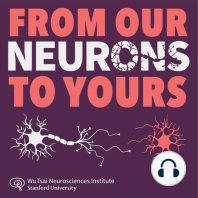2 min listen

Respect your Biological Clock | Erin Gibson
Respect your Biological Clock | Erin Gibson
ratings:
Length:
16 minutes
Released:
Mar 2, 2023
Format:
Podcast episode
Description
We've probably all heard of circadian rhythms, the idea that our bodies have biological clocks that keep track of the daily cycle, sunrise to sunset. Maybe we've even heard that it's these biological rhythms that get thrown off when we travel across time zones or after daylight savings.So on one hand, it's cool that our body keeps track of what time it is, but today our question is just how important are our circadian rhythms to our health and wellbeing? Do we need to be paying attention to these daily rhythms and what happens if we don't? So we asked Stanford circadian biology expert, Erin Gibson. LinksGibson LabStanford Center for Sleep and Circadian ScienceStanford Division of Sleep MedicineReferencesRhythms of life: circadian disruption and brain disorders across the lifespanCircadian disruption and human health: A bidirectional relationshipThe arrival of circadian medicineEpisode CreditsThis episode was produced by Michael Osborne, with production assistance by Morgan Honaker and Christian Haigis, and hosted by Nicholas Weiler. Cover art by Aimee Garza.Thanks for listening! Learn more about the Wu Tsai Neurosciences Institute at Stanford and follow us on Twitter, Facebook, and LinkedIn.
Released:
Mar 2, 2023
Format:
Podcast episode
Titles in the series (31)
Announcing: From Our Neurons to Yours! by From Our Neurons to Yours